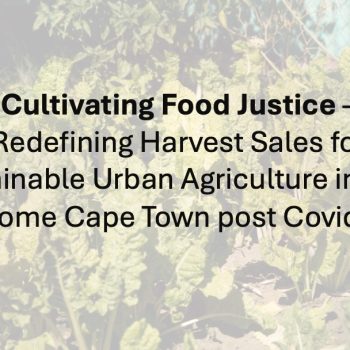The project builds on a ‘transformative collective action’ approach to study urban ecology and civic-led urban ecological changes (Ernstson 2011). The study compares how civic organizations in Cape Town and New Orleans, two port-cities with a long history of systematic apartheid and racial segregation, have produced both cultural and political changes, and indeed ecological changes. We use archival and secondary material to analyze the historical and political ecology of these cities, especially how elite projects have shaped these cities ecologies. This is paired with in-depth case studies that aims to trace how historically marginalized Black/’Coloured’ neighbourhoods in Cape Town, and African American neighbourhoods in New Orleans, have engaged local green areas such as protecting and rehabilitating wetlands, urban farming, and tree planting. These instances of collective action are means by which civic groups forge ties, access state resources, and produce biophysical changes, but also changes in how urban nature is culturally framed to potentially serve as vehicle to address environmental injustices. These studies will be paired with broader-level ecological assessments and a civic network study of how a range of civic associations address urban ecological issues and ‘green spaces’. The projects builds and complements the ‘Ways of Knowing Urban Ecology’ project above but also uses quantiative methods like social network analysis (SNA) and biophysical assessment methods. It strives to combine ecological and social sciences to critically engage and influence the discourse on social-ecological systems and resilience.
Researchers: Dr. Henrik Ernstson (PI), Joshua Lewis (PhD student), Professor Mario Diani, Dr. Pippin Anderson, Dr. Wayne Zipperer, Dr. Lorien Jasny, Professor Susan Parnell, Professor Thomas Elmqvist.

